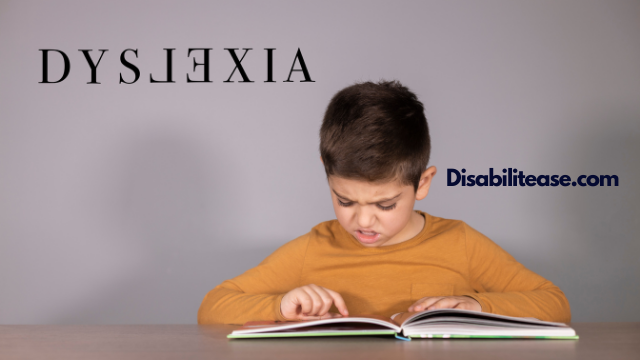Can your dyslexia flare up? The answer is no. Dyslexia is a broad spectrum of learning deficits that impair one’s ability to read, spell, and write effectively. It has two subgroups with varying symptoms; visual and auditory Dyslexia.

Individuals with visual Dyslexia find it hard to make sense of different letters, digits, and symbols. On the other hand, those with auditory Dyslexia have low phonological awareness and find it hard to spell out words and sentences.
It is a common misconception that Dyslexia can become worse over time due to changes in the brain. However, this is never the case as it is a neurobiological condition that happens due to a deficit in a specific part of the brain.
We have a related article for you, you can read Can Dyslexia Impact Speech?
The deficit cannot become severe or cause more challenges later on. In reality, it usually becomes more manageable as people adopt specialized learning strategies to cope with it.
Multiple studies have found individuals improving both their decoding skills, visual comprehension, and working memory once systematic and individual support is provided consistently. That being said, there are a few instances where your Dyslexia might “seem” to worsen.
Table of Contents
What Can Make Dyslexia Worse?
Individuals with Dyslexia have a limited working memory which makes it harder for them to cope with multitasking. For this reason, they might feel their symptoms worsen if there is time pressure, such as doing a set of MCQs within a given time.
This can further deteriorate if they have not received enough specialized support, learned compensatory strategies, or gained proper orientation. Some of the factors that can make your dyslexia act worse than usual are explained below.
Mental Health
Mental health can play a huge role in sudden spikes in symptoms. Stress, anxiety, confusion, and low self-esteem are some of the common factors that can worsen your Dyslexia.
Such factors can impair the efficiency of a learner, causing more difficulty in decoding, pronouncing, and ultimately comprehending a piece of text. Many studies have also found a correlation between stress and lower digit span recall.
However, it’s important to remember that Dyslexia is a neurological condition and can’t be influenced by external factors significantly. Therefore, even if stress and emotions deteriorate your reading, spelling, or thinking abilities, it is always short-lived.
Compensatory Strategies
People who have Dyslexia often adopt learning practices and approaches that help them compensate for their deficits. For example, children with Dyslexia learn to decode more effectively by reading out loud.
Another common strategy is finger-counting and mental visualization to improve digit span. Dyslexia can flare up and make reading a text or numbers difficult when such compensatory strategies are taken away. This is often evident in standardized tests such as IQ, SAT, or even school exams, where fluency and automatic reading are critical.
Implicit Memory
Implicit memory is the series of information and details our brain can memorize and absorb momentarily. People with Dyslexia have limited implicit and working memory, which makes mental problem-solving difficult, especially when a lot of new information is involved. For this reason, your Dyslexia might feel worse as the strain on working memory is increased.
A 1994 study on children with Dyslexia found that their digit span recall became worse as more numbers were added to the series. However, such instances do not mean that your Dyslexia has become worse. These simply occur due to compromised working memory and not deteriorating decoding or spelling skills.
Can Dyslexia Worsen Over Time?
Dyslexia is a broad spectrum of learning deficits with multiple dimensions. To understand whether or not it can become worse, it’s important to understand these dimensions first.
Fluency
One of the biggest challenges for people with Dyslexia is their reading speed. Individuals with Dyslexia often fail to decode letters, words, and digits despite successfully learning and recognizing them previously. This means every word seems brand-new to their brain no matter how many times they read it.

The only way to get better at reading with Dyslexia is by improving one’s phonological awareness, visualization skills, and adopting various compensatory strategies. While Dyslexia can’t worsen neurologically, the initial lag can compound over time.
Various studies have found that children with Dyslexia start to dislike reading and prefer learning through audio instead. This can create a ripple effect where dyslexic people are not able to practice the compensatory strategies consistently, resulting in slower fluency with time.
Sound Sequence
When most people hear the word “Dyslexia”, they immediately think about a reading difficulty where someone has trouble understanding letters. However, Dyslexia is much more than that. One of the reasons individuals with Dyslexia can’t read is due to their low phonological awareness.
There are three aspects to phonological awareness; the sound of individual letters, a combination of individual letter sounds, and accurate sequencing of such sounds. While Dyslexia cannot deteriorate your phonological awareness over time, it can seem to flare up when reading complex text.
The biggest challenge will manifest in terms of sound sequencing a big word. For example, properly sequencing the sounds of letters in the word “day” is easier than doing the same for words like “evening”, “sunshine” or “raining”.
This can make reading more difficult as the text pieces one is dealing with become more complex. Unless proper support is provided and you practice your phonological awareness and concentration, Dyslexia can seemingly worsen as you reach advanced classes.
Engagement
One of the ways people with Dyslexia learn to read is by concentrating their attention on each letter at a time. This practice can become an irreplaceable tactic later on, which often does more harm than good.
Whenever teachers and parents encourage this practice, they forget that the main point of reading is learning and comprehension. Children educated with such a practice often forget to engage with the text. They are not able to extract meaning out of their reading because they are concentrating too much on individual letters.
Some people can therefore face more problems later on when dealing with complex text and arithmetic. For this reason, it’s important to prioritize text engagement and meaning extraction over decoding.
Typography
An often ignored aspect of Dyslexia is the role typography plays in text readability. Because Dyslexia is not just about understanding letters but different visual symbols and shapes, the style of fonts can make a lot of difference.
While you might not face as much difficulty reading familiar text in fonts like Times New Roman or Sans Serif, your Dyslexia can make letters more unrecognizable when dealing with a creative or stylized font.
However, this might not be the case for everyone who has Dyslexia. Individuals with visual Dyslexia will have a harder time decoding differentiated typography than those with auditory Dyslexia. This is because the two subgroups have different deficits and learn differently. Individuals with Auditory Dyslexia have trouble spelling out the words and find it hard to learn in terms of phonemes (sounds).
Conclusion
There is no doubt that Dyslexia is a complicated condition with varying symptoms and severity. Despite it causing significant disruption in one’s academic and professional life, individuals usually report less frustration over time.
Also, you have to check out my post on the Best 5 Smart Pens For Dyslexia | Do They Really Help?
Specialized support from teachers and parents can play a pivotal role in how your Dyslexia behaves in later stages of life. Because you will be dealing with heavier text and more complex arithmetic as you progress to higher education, practicing effective learning strategies will become more important. It’s also critical to never stop reading as it is the only way to train your brain to read more effectively over time.

Hi, my name is Eddie, I am a professional trainer specializing in the elderly population and I’m also a website designer. I love training in the gym, going to the beach, traveling, and having good food.
I combined my love for sport and website designing to make “DisabilitEase” whose purpose is to help elderly and disabled people live a more full and active life, have more fun, and enjoy their unique journey despite any disability.



